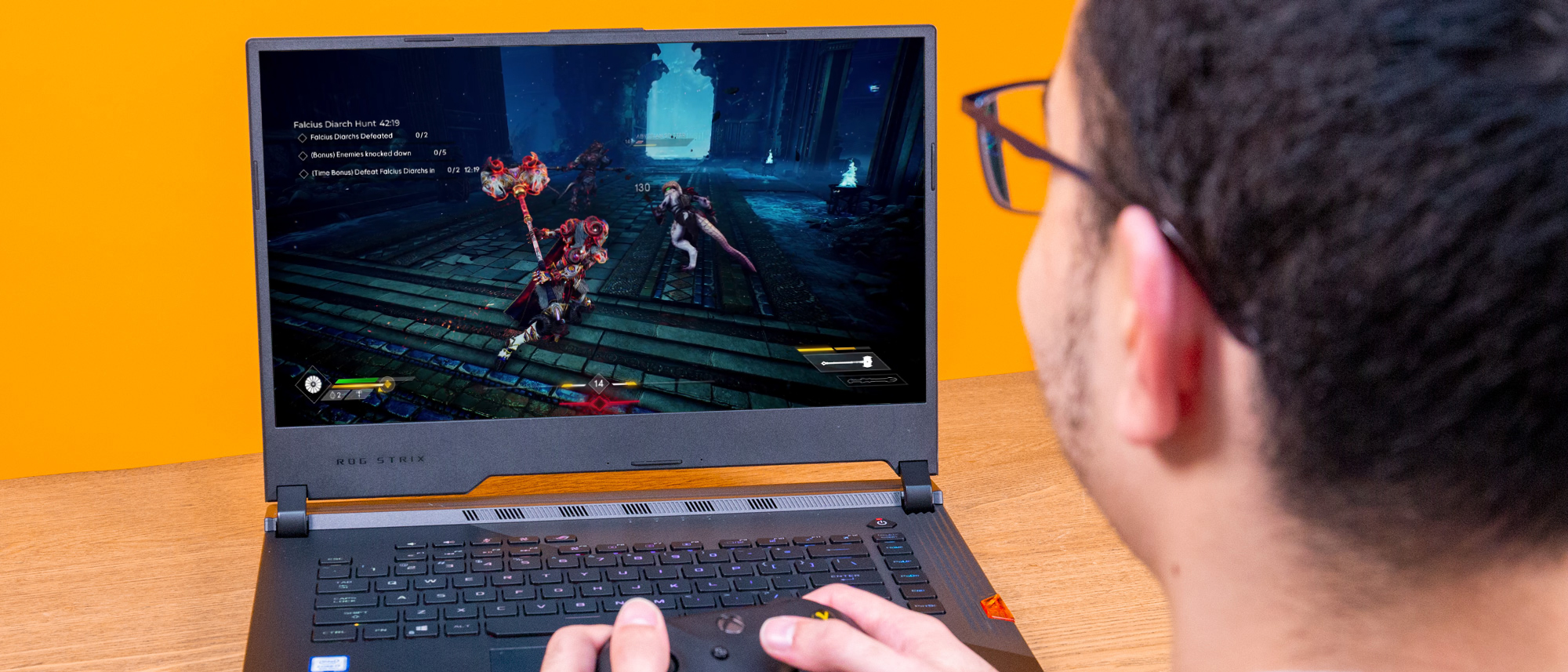Laptop Mag Verdict
Godfall provides sparse moments of intensity through challenging boss fights and satisfying combat mechanics, but the overall experience is weighed down by a bland world, overly familiar progression systems and a one-dimensional gameplay loop.
Pros
- +
Intricate combat system
- +
Exciting boss fights
- +
High level of detail
Cons
- -
Death means nothing
- -
Uninspired art direction
- -
Generic loot and progression
- -
Repetitive gameplay loop
Why you can trust Laptop Mag
Godfall knows exactly what it wants to be. It’s a “looter slasher” where the player spends most of their time sprinting through vibrant worlds and beating the living crap out of the foes they encounter. When you’re not fighting, you’re opening chests, collecting loot and equipping new gear.
These aren’t ambitious goals, yet the game isn’t particularly successful in accomplishing them. There are an abundance of ways in which Godfall could improve, but even if it fixed some of its minor issues, it’s hard to imagine justifying a $70 price tag for an experience that has such a shoddily built foundation.
Intricate combat system
Godfall’s combat system is surprisingly engaging thanks to the level of intricacy present throughout. Players can dodge, parry, block, throw their shields, use two special abilities attached to a weapon, attack weak points, execute critical strikes on staggered enemies and utilize the Soulshatter system. Soulshatter is a meter that gradually fills up on an enemy whenever the player hits them with a light attack, and after executing a heavy attack, the amount of Soulshatter built up deals damage to their health.
Thanks to this system, the player isn’t just spamming the light and heavy attack buttons haphazardly. How you coordinate the number of light attacks before striking with a heavy attack is important, especially when fighting bosses with a sliver of health left. However, the engaging complexity of the combat systems is for nothing because Godfall is much too forgiving.
Throughout most encounters in Godfall, death has no value. If you’re roaming one of its three worlds and die to a regular enemy, you’re swiftly resurrected in the same spot without the battle resetting. For example, if I were fighting a challenging foe and died when I had nearly beaten them, the game would throw me right back into the fight and I could easily continue from where I left off.
Failure having no consequences significantly reduces the tension of combat. Why would I ever bother to block or parry? What reason is there to attack an enemy’s weak point or use my special abilities? Godfall boasts a pretty complex combat system where there are tons of exciting ways to adapt mid-fight, yet it all feels meaningless when you can just win by spamming light attacks over and over.
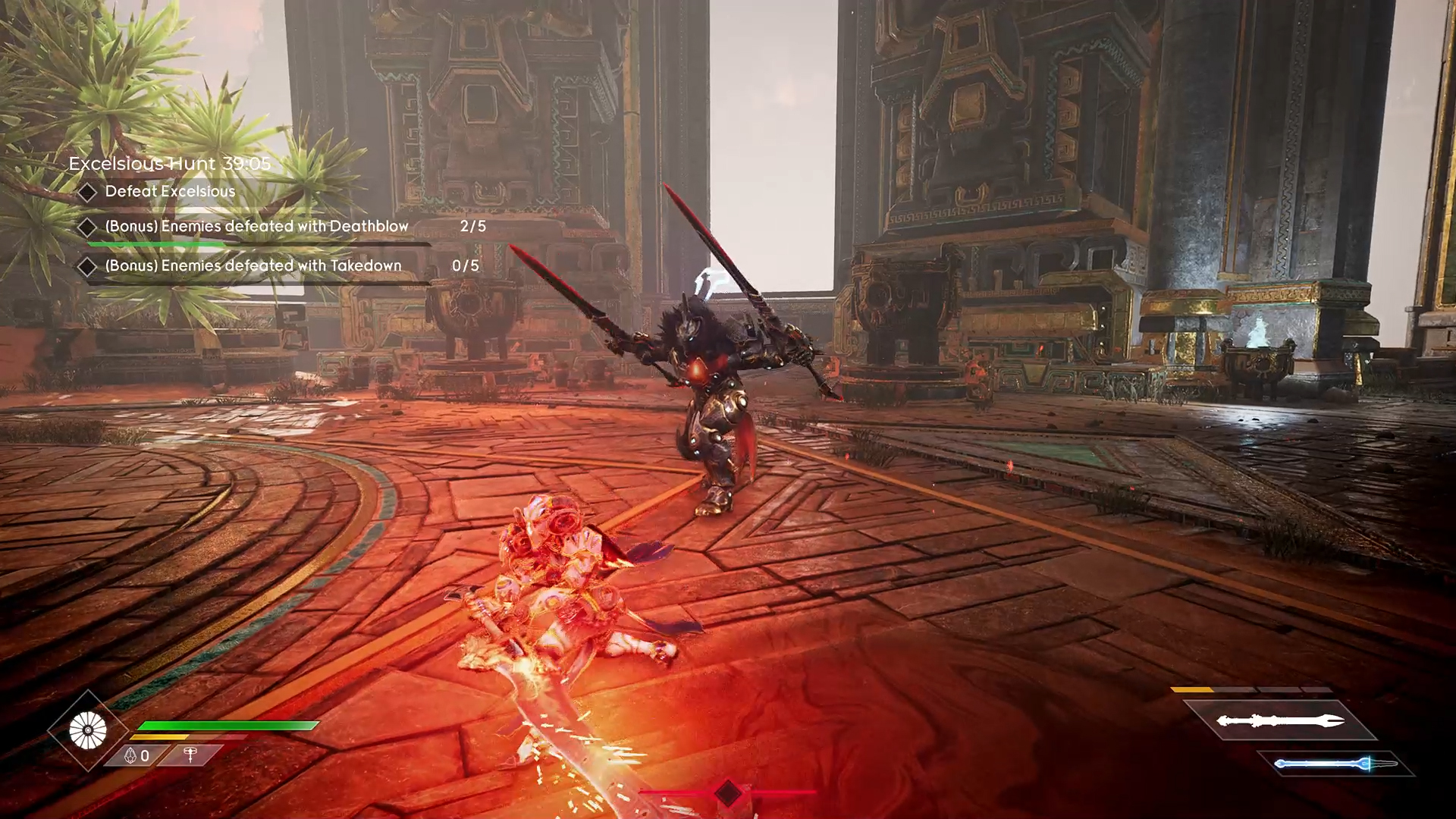
Furthermore, Godfall’s gameplay loop relies heavily on this combat system. Looting is its secondary mechanic, but in the end, that’s also in the service of enhancing your combat abilities. For a game so focused on these systems to undeliver in how it has the player approach combat is a pretty severe oversight. I’ve spent 15 hours with Godfall and a large majority of it involved mindlessly pressing the attack buttons in random sequences to proceed through an area.
Sign up to receive The Snapshot, a free special dispatch from Laptop Mag, in your inbox.
Exciting boss fights
Thankfully, death carries some weight during a boss fight. These enemies are classified as “lieutenants,” and each of them comes with a number of phases. If you die during a phase, the boss regains all health lost and you have to try again. This is what the entirety of the game should play like.
While the majority of the game is far too forgiving, you can seem a glimmer of what Godfall could be. Now all those strategic button presses make sense as does the constant equipment upgrades. There are a lot of ways to approach each fight and its combat system is surprisingly intricate. If you make one wrong move, nearly half of your health could disappear, and you’re only given three healing items. Additionally, you have to react in specific ways against every move.
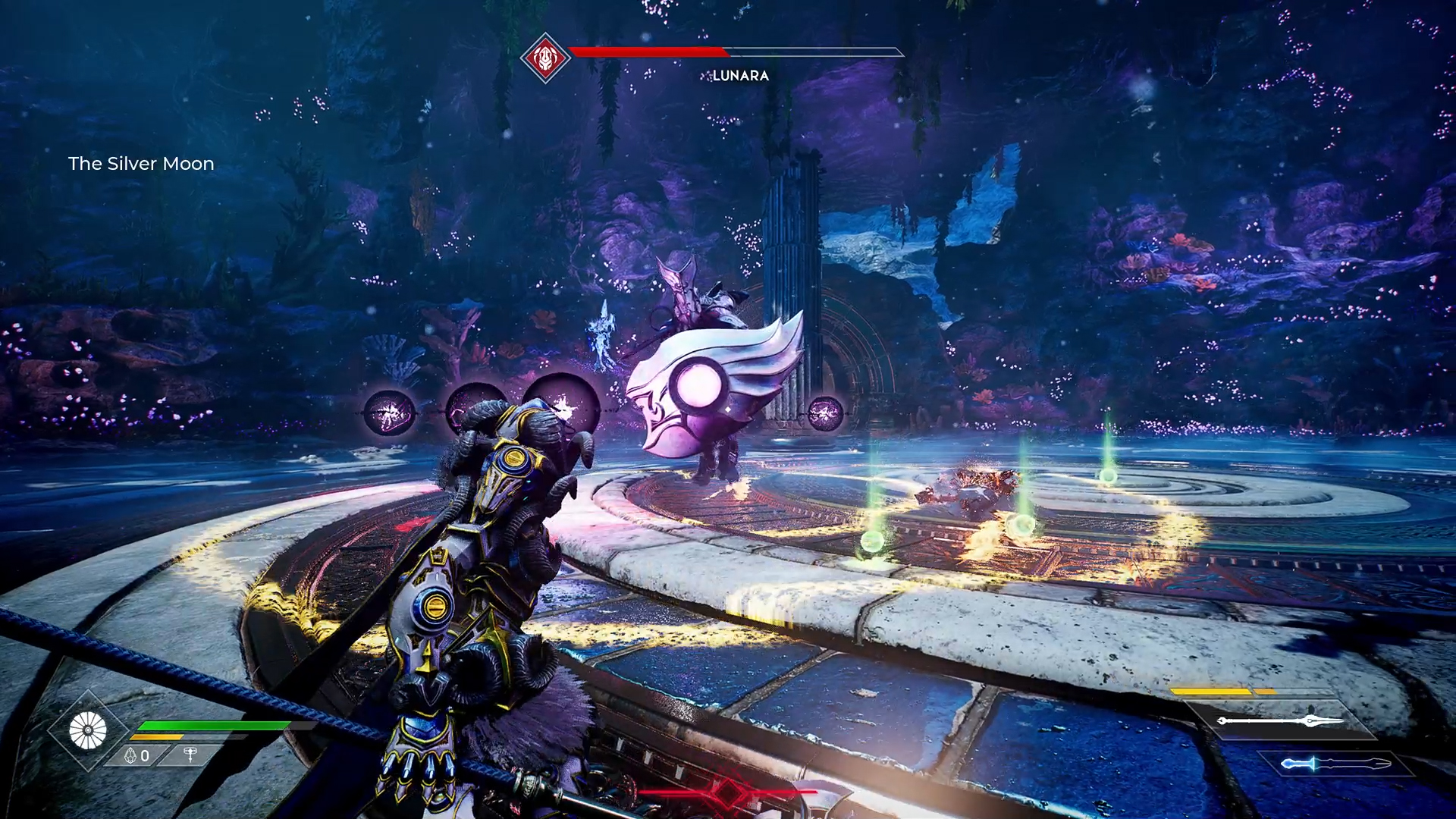
If the boss glows blue or tosses a projectile at you, get ready to parry and strike. If the boss glows red, dodge away as fast as possible. If a dot appears on a boss at any time, point your cursor at it and quickly strike, causing them to stagger temporarily. This is when Godfall is actually fun to play, as its complicated combat system needs to be skillfully utilized to progress.
However, this creates an awkward synergy. The first time you encounter a Lieutenant is the only moment throughout the entire Earth realm (the first world) where you have to learn how to play the game to proceed. Beforehand, you could just spam attacks and still easily make progress. This will be a pretty frustrating barrier for some players, as they’ve spent their time with Godfall not needing to think about what to do to succeed, and now, the game is expecting them to play at their best and utilize everything in their arsenal.
Uninspired but nice-looking world
Godfall boasts a vibrant art direction where every tree is brightly colored, tons of exotic foliage fill scenes, and each castle is made of a material that is overwhelmingly shiny. This aesthetic might appeal to some, but it often feels like each world lacks unique setpieces. Additionally, I don't like how areas aimlessly float next to giant low-polygon rocks and randomly placed castle sections.
If you spend enough time in one world, you pretty much know exactly what to expect from the rest of it, as it’s mostly populated by the same style of foliage and architecture. The lack of variety between each mission within an area caused Godfall to get a bit stale. Despite this, the game undeniably looks nice.
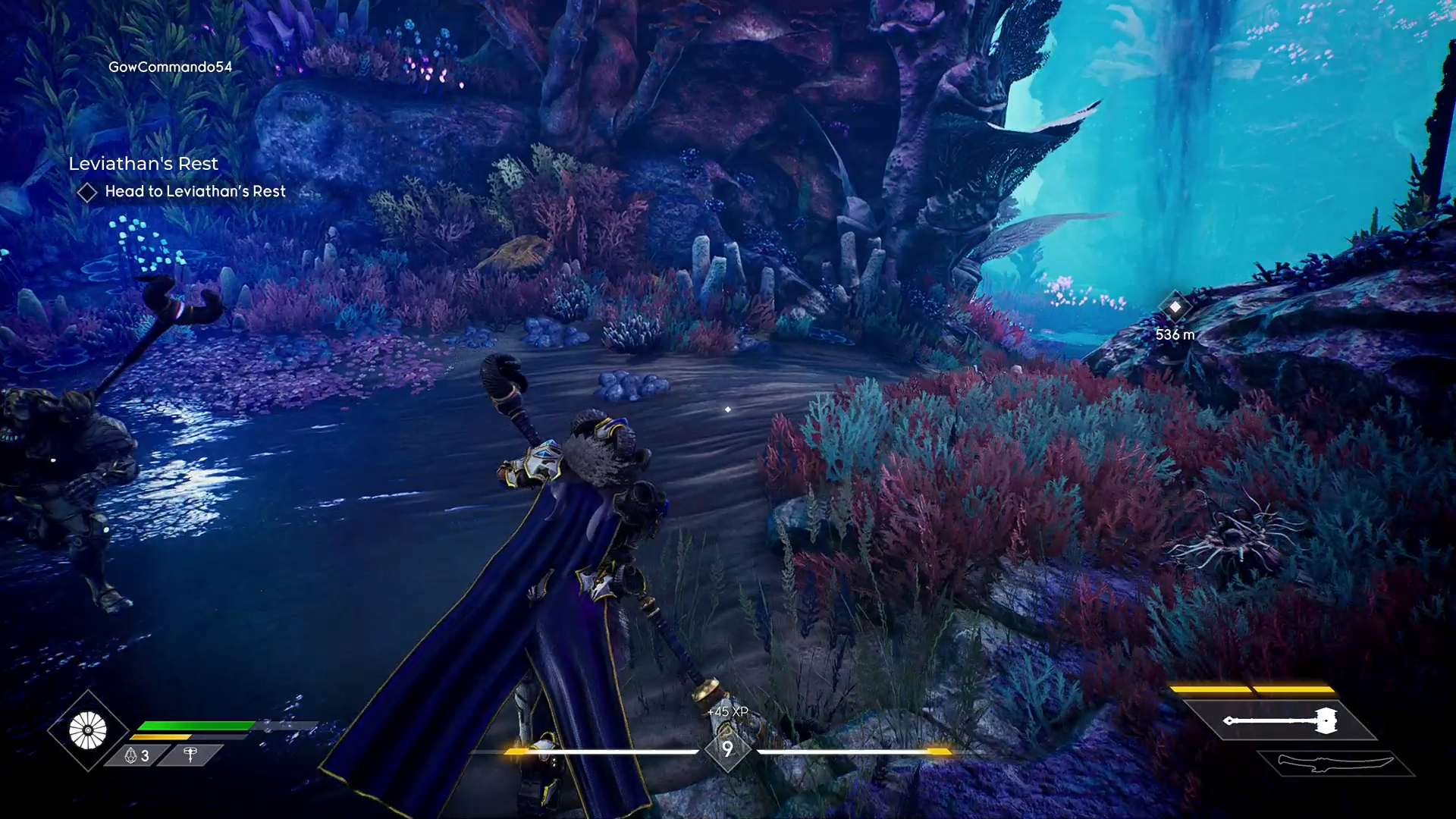
This is mostly thanks to a decently high level of detail, as you can see rocks, flower petals and tree leaves often thrown around custom-made floors. Green and red moss grows up against castle walls, certain buildings show unique signs of decay, and the presence of a shattered pillar or wooden carriage wheel adds realism to a scene.
My favorite area is the Water realm; it has a ridiculous level of variety in the types of plants present, with some being round-shaped, others looking like coral, a few even glow and each one of them is a different color. It creates a unique effect, making the player feel like they’re exploring something alien and unfamiliar.
Generic loot and progression
Godfall possesses a standard approach to progression and loot, which is a big part of the reason why it’s classified as a “looter slasher.” With every chest you open up or boss you beat, you’ll receive tons of gear in the form of weapons, rings, charms, banners or necklaces. Similar to most looter-style games, the loot you equip is determined by a number assigned to it. It never feels like the player is making a conscious decision regarding what their build looks like and how it affects their gameplay.
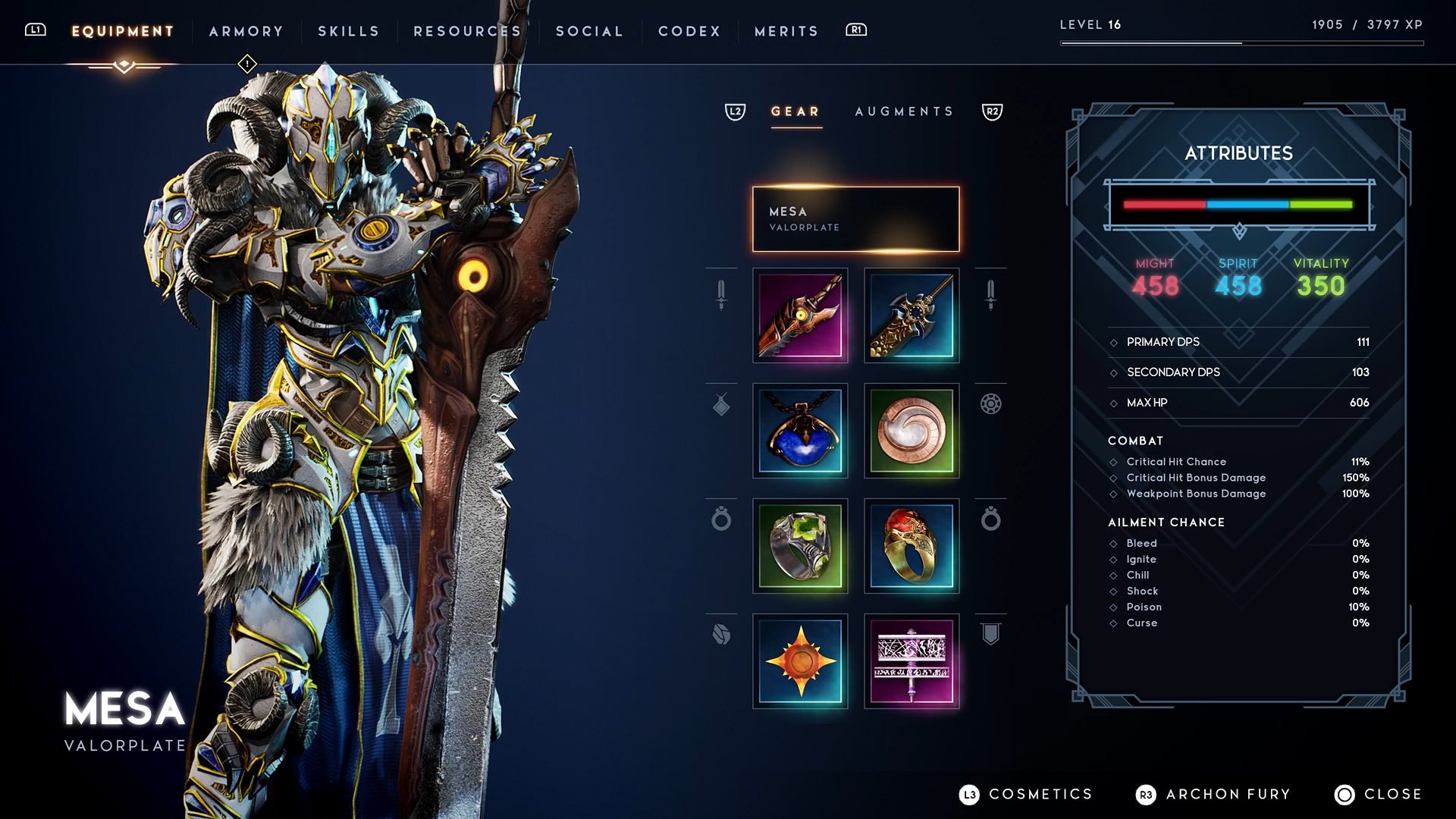
Additionally, the game only has three primary stats: Vitality, Might and Spirit. Vitality increases your health, Might increases your damage and Spirit increases the effectiveness of healing items. There’s not much to get excited about here, but if you’re someone who enjoys simplicity, it might not bother you much.
However, it’s hard to grasp systems this simple in an RPG, even one more focused on action elements. There’s a noticeable lack of utility or support builds, with every skill, Valorplate (the suit of armor you wear), and gear-piece servicing your ability to strike, dodge or parry. This might work in a game that’s solely focused on combat, but if Godfall intends to grow with expansions and additional content, it’s hard to imagine this working without in-depth progression systems that keep the player addicted to its loop.
Godfall PC and PS5 performance
Ideally, Godfall loads in mere seconds, assuming you’re using an SSD. If so, you don't need to go through the pain of sitting through a loading screen. Even if you’re not boasting an SSD, loading in after death isn’t much of a problem as the game doesn’t reset any encounters when you die. You just return a few inches from where you perished and can continue on.
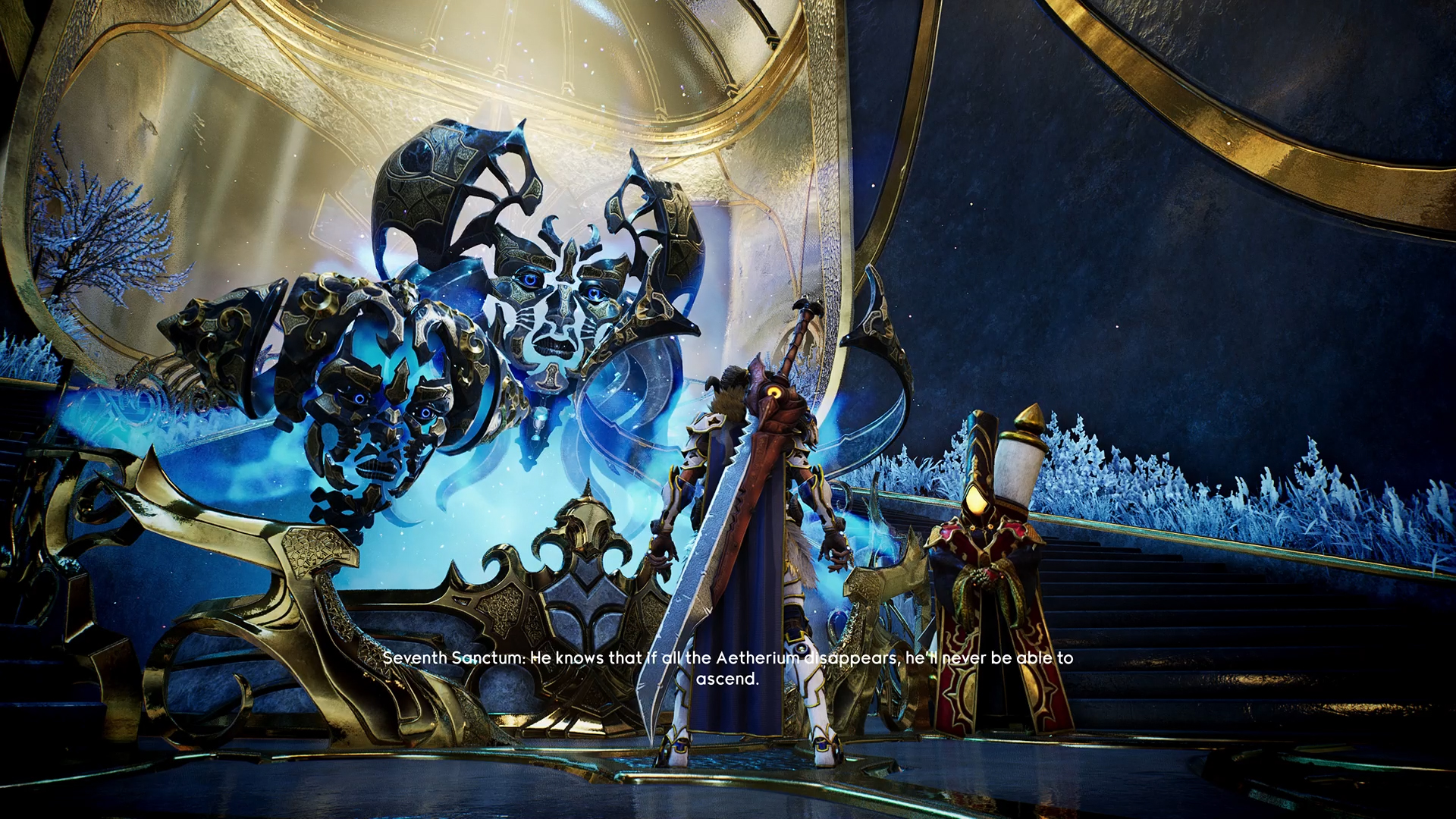
While playing on PS5, I experienced frequent crashing on Godfall. The worst of which was when I battled the final boss, and right when the ending cutscene started, the game swiftly shut down on me. When I relaunched the game, I had to restart the entire mission and fight the boss again. This was a bit frustrating, as he was pretty tough, but I honestly didn’t mind too much since Godfall is most fun during these challenging encounters.
Godfall PC requirements
I initially tested Godfall on my desktop, which is equipped with an Nvidia GeForce GTX 970 GPU with 4GB of VRAM and an Intel Core i7-6700K CPU. Although my GPU doesn’t hit the minimum requirements, I was still able to play the game at 1080p on the lowest settings with an average of 45 frames per second.
However, I experienced a few freezes here and there, and the experience was not particularly enjoyable, especially since low settings look pretty ugly. I tested the game on high settings and got an average of 21 frames per second, which is not particularly smooth to play, but it’s a lot better than I expected considering I’m running on such outdated hardware.
As a result, I stuck to playing the game on PS5, but I also tested Godfall on a desktop with a Nvidia GeForce GTX 1070 GPU with 8GB of VRAM through the benchmark on Epic settings at 1440p and got an average of 28 frames per second. At 1080p, I got 36 frames on Epic settings.
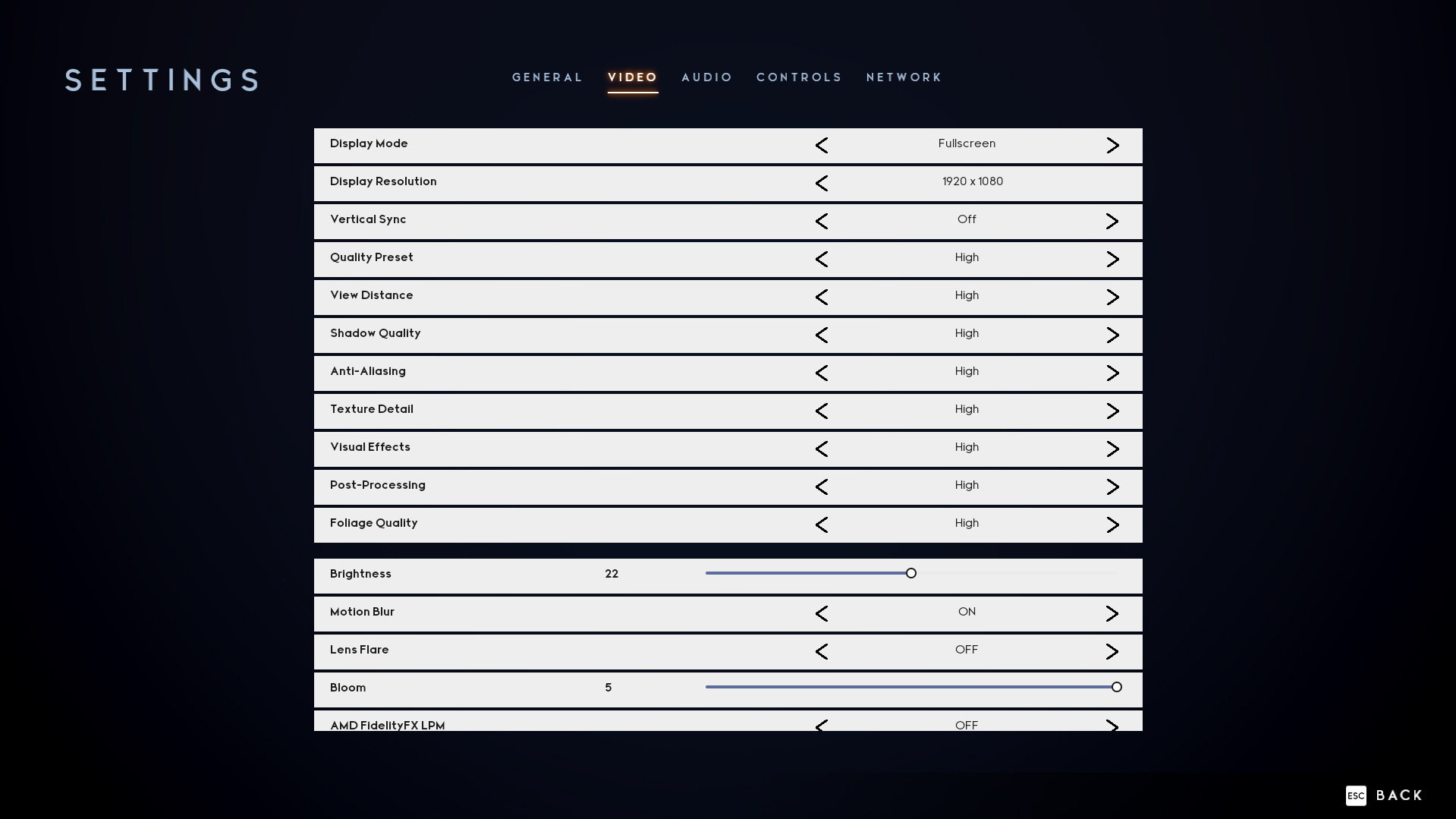
Quality presets can be changed between Low, Medium, High and Epic. This affects view distance, shadow quality, anti-aliasing, texture detail, visual effects, post-processing and foliage quality. You can also turn motion blur, lens flare and AMD FidelityFX LPM on or off. Display modes can be switched between Fullscreen, Windowed and Windowed Fullscreen, but for some reason, Windowed Fullscreen is capped at 720p resolution. V-Sync is also available.
The minimum requirements to run Godfall includes Windows 10, an AMD Ryzen 5 1600 or Intel Core i5-6600 CPU, 12GB of RAM, AMD Radeon RX 580 or Nvidia GeForce GTX 1060, 6GB of VRAM and 50GB of free storage space.
The recommended requirements include Windows 10, an AMD Ryzen 5 3600 or Intel Core i7-8700 CPU, 16GB of RAM, AMD Radeon 5700 XT or Nvidia GeForce GTX 1080 Ti, 8GB of VRAM and 50GB of free storage space.
Bottom Line
Godfall is the weakest link in the PS5’s launch lineup. Its gameplay loop relies too heavily on one style of play and its progression systems are overly familiar. Even though the combat system is intricate, the lack of consequence takes away from the intensity of each battle. Additionally, it’s hard to appreciate the experience when you’re frequently doing the same thing over and over.
This is why Godfall shines most during boss fights, as you’re forced to adapt to every new attack. You can’t just mindlessly press R1 and R2 haphazardly, which is essentially how you’re going to be playing the rest of the game.
And even if Godfall’s combat encounters were satisfying, it's still weighed down by a repetitive and uninspired art direction. The game does look nice thanks to a high level of detail and fidelity, but more isn’t necessarily better. If you’re looking into playing Godfall at some point, I’d only recommend it for $15 or less.

Self-described art critic and unabashedly pretentious, Claire finds joy in impassioned ramblings about her closeness to video games. She has a bachelor’s degree in Journalism & Media Studies from Brooklyn College and five years of experience in entertainment journalism. Claire is a stalwart defender of the importance found in subjectivity and spends most days overwhelmed with excitement for the past, present and future of gaming. When she isn't writing or playing Dark Souls, she can be found eating chicken fettuccine alfredo and watching anime.
